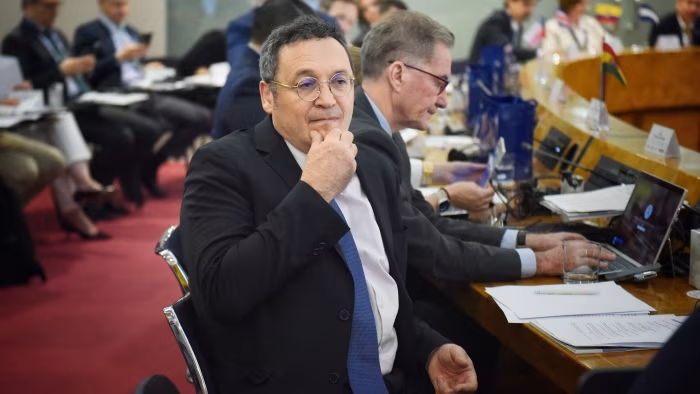Álvaro García Ortiz: A Comprehensive Overview
Álvaro García Ortiz is a significant figure within Spain’s legal and judicial system. As a career prosecutor, his professional life has been dedicated to public service, culminating in one of the most senior legal positions in the country. Understanding his journey, responsibilities, and the context of his role provides valuable insight into the workings of Spain’s justice system. This article offers a detailed look at his background, career progression, and the broader implications of his work. We will explore his educational path, key professional milestones, and the general duties associated with his high-profile position, all while maintaining a factual and neutral perspective.
Key Takeaways
- Who is Álvaro García Ortiz? He is a prominent Spanish prosecutor who has risen through the ranks to hold one of the highest legal offices in Spain.
- Career Path: His career is marked by a long-standing commitment to public prosecution, with experience in various specialized areas of law.
- Role and Responsibilities: His position involves leading the Public Prosecutor’s Office, ensuring the uniform application of law, and upholding the principles of legality and impartiality.
- Public Profile: Due to the nature of his role, his actions and decisions often receive significant media attention and public scrutiny.
- Broader Impact: His leadership influences legal policy, the direction of public prosecutions, and the overall perception of the Spanish justice system.
Early Life and Educational Foundations
Every public figure has a story that begins long before they step into the spotlight. For álvaro garcía ortiz, his journey toward a distinguished legal career started with a solid educational foundation. While specific details about his early life are generally kept private, it is understood that he pursued a law degree, a common and necessary prerequisite for a career in the Spanish judiciary or public prosecution service. This period of intense study would have equipped him with a deep understanding of Spain’s legal framework, from constitutional law to criminal procedure. This foundational knowledge is critical for anyone aspiring to navigate the complexities of the justice system.
The path to becoming a prosecutor in Spain is exceptionally demanding. After obtaining a law degree, candidates must pass a rigorous public examination process known as an oposición. This competitive exam tests a vast range of legal knowledge and is designed to select only the most capable and dedicated individuals for public service. Successfully passing this examination is a significant achievement in itself and marks the official entry into the judicial or prosecutorial corps. This early academic and competitive success set the stage for the long and impactful career of álvaro garcía ortiz, demonstrating from the outset a commitment to the principles of law and justice.
The Rigorous Path to Becoming a Prosecutor
The journey to becoming a public prosecutor in Spain is not for the faint of heart. It is a multi-year commitment that demands exceptional discipline, intellect, and perseverance. Aspiring prosecutors spend years preparing for the oposición, an examination system renowned for its difficulty. The process involves memorizing and fluently articulating vast amounts of legal text, participating in oral examinations before a tribunal of senior judges and prosecutors, and demonstrating an encyclopedic knowledge of the law. This system ensures that those who enter the profession are not only knowledgeable but also possess the resilience required for a career in public service.
This rigorous selection process is designed to guarantee the independence and capability of the judiciary and prosecution services. By selecting candidates based on merit alone, the system aims to create a body of professionals who are beholden only to the law. The training that álvaro garcía ortiz would have undergone is a testament to this tradition. It instills a deep-seated respect for legal principles and prepares individuals for the immense responsibility of representing the public interest in legal proceedings. This shared experience creates a strong sense of identity and purpose among Spanish prosecutors.
Early Career and Professional Development
After successfully entering the Public Prosecutor’s Office, a new professional begins their practical training and career. The early years are often spent in various regional or provincial offices, handling a wide array of cases. This foundational experience is crucial for developing practical skills in litigation, investigation, and legal analysis. For a prosecutor like álvaro garcía ortiz, this period would have involved working on everything from common criminal cases to more complex civil matters, providing a comprehensive understanding of the justice system from the ground up. It is a time of immense learning, where theoretical knowledge is applied to real-world situations, shaping a prosecutor’s judgment and professional style.
As a prosecutor gains experience, they often have the opportunity to specialize in specific areas of law. These specializations can include environmental law, economic crimes, digital-age offenses, or international cooperation. Such specialization allows a prosecutor to develop deep expertise in a particular field, making them a valuable asset to the institution. The career trajectory of álvaro garcía ortiz reflects this pattern of progressive specialization, which ultimately prepared him for roles with greater responsibility. This continuous professional development is a hallmark of a career dedicated to public service, ensuring that the Public Prosecutor’s Office remains equipped to handle the evolving challenges of modern society.
Rise to Prominence: Key Career Milestones
The career of a public prosecutor is often a ladder of increasing responsibility. For álvaro garcía ortiz, his path includes several notable milestones that highlight his expertise and leadership capabilities. Over the years, he took on roles that moved from general practice to highly specialized and senior positions. A key part of his career involved working in areas related to environmental law, where he became a recognized authority. This focus on protecting the environment through legal means demonstrated an ability to tackle complex, modern legal challenges that have significant societal impact.
His leadership journey also included roles within prosecutorial associations, where he worked to represent the interests of his colleagues and contribute to the internal governance of the profession. Such roles are vital for fostering a sense of community and advocating for the resources and independence necessary for prosecutors to perform their duties effectively. His election to these positions indicates the respect and trust he earned from his peers. These experiences in leadership, combined with his specialized legal knowledge, created a profile of a well-rounded and capable professional, paving the way for his eventual appointment to the highest echelons of the Spanish Public Prosecutor’s Office.
|
Career Milestone (Illustrative) |
General Timeframe |
Description of Role |
|---|---|---|
|
Entry into Prosecutorial Career |
Late 1990s |
After passing the state examination, began work as a prosecutor in a provincial office. |
|
Specialization in Environmental Law |
2000s |
Became a delegate prosecutor for environmental and urban planning matters, focusing on complex cases. |
|
Leadership in Professional Associations |
2010s |
Held senior positions in prosecutorial unions, advocating for the rights and interests of fellow prosecutors. |
|
Appointment to Senior Role |
Early 2020s |
Appointed to a top leadership position within the Public Prosecutor’s Office of Spain. |
The Role of Spain’s Attorney General
In Spain, the head of the Public Prosecutor’s Office holds the title of Fiscal General del Estado, which translates to Attorney General of the State. This is the position that álvaro garcía ortiz was appointed to hold. The role is one of immense importance and responsibility within the Spanish constitutional framework. The Attorney General is responsible for leading the entire Public Prosecutor’s Office, an autonomous body integrated within the judicial branch but with functional independence. The primary mission is to promote the action of justice in defense of legality, the rights of citizens, and the public interest.
The Attorney General’s duties are multifaceted. They are tasked with issuing instructions and circulars to ensure that all prosecutors across Spain apply the law in a uniform and coherent manner. This is crucial for legal certainty and equality before the law. Additionally, the Attorney General represents the institution at the highest level, interacting with other branches of government, the judiciary, and international legal bodies. They are appointed by the King, at the proposal of the Government, after consultation with the General Council of the Judiciary. This appointment process underscores the role’s significance, placing the individual at the intersection of the executive and judicial powers.
Responsibilities and Mandate
The mandate of the Attorney General is clearly defined by the Spanish Constitution and the Organic Statute of the Public Prosecutor’s Office. A core responsibility is to direct and coordinate the activities of all prosecutors. This involves setting prosecutorial priorities, which might include focusing on specific types of crime like corruption, organized crime, or gender-based violence. The person in this role, such as álvaro garcía ortiz, must ensure that the office has the resources and strategies to effectively combat these threats. They do not decide the outcome of cases—that is the role of judges—but they direct how the state presents its case in court.
Furthermore, the Attorney General has a duty to uphold the principles of legality and impartiality. This means that prosecutions must be based solely on the law and evidence, free from any external pressure or political influence. Maintaining this institutional independence is perhaps the most critical—and often most challenging—aspect of the job. The Attorney General is accountable to the Spanish Parliament (Cortes Generales), where they must present an annual report on the activities of the Public Prosecutor’s Office, providing a mechanism for democratic oversight.
Public Communication and Transparency
In a modern democracy, public communication is a vital function for any major public office. The Attorney General is the primary public face of the Public Prosecutor’s Office. This involves explaining the institution’s actions, clarifying legal complexities for the public, and fostering trust in the justice system. The communication style of the office holder can significantly shape public perception. A clear, measured, and transparent approach can help demystify the legal process and reinforce the idea that the office is working in the public interest.
For a figure like álvaro garcía ortiz, every public statement, press conference, and parliamentary appearance is scrutinized. The goal is to communicate effectively without compromising ongoing investigations or the presumption of innocence. This delicate balance requires exceptional skill and judgment. By providing context for major prosecutorial decisions and outlining the legal reasoning behind them, the Attorney General can help ensure that public debate is well-informed. This commitment to transparency is essential for maintaining the legitimacy and credibility of the Public Prosecutor’s Office in the eyes of the citizens it serves.
Notable Initiatives and Legal Focus
Every leader brings their own priorities and focus to a public role. During his time in senior positions, including as Attorney General, álvaro garcía ortiz has been associated with several key legal and institutional initiatives. Building on his long-standing expertise, a continued focus on environmental law has been a prominent theme. This includes pursuing more robust prosecution of environmental crimes, such as illegal dumping, pollution, and destruction of natural habitats. By prioritizing these cases, the Public Prosecutor’s Office sends a strong message that protecting the natural world is a matter of public interest and legal importance.
Another area of focus often involves modernizing the institution itself. This can include initiatives related to digital transformation, such as implementing new technologies to improve case management and investigative capabilities. As discussed in an article on https://versaillesblog.com/, adapting to the digital age is crucial for all public institutions. For prosecutors, this means developing expertise in handling digital evidence, combating cybercrime, and using data analytics to identify crime patterns. These modernization efforts are vital for ensuring that the justice system can keep pace with a rapidly changing world and effectively address the challenges of the 21st century. The leadership of álvaro garcía ortiz would naturally be instrumental in guiding these transformative projects.
Emphasis on Human Rights and Social Justice
Beyond specific legal categories, a broader emphasis on human rights and social justice often characterizes the agenda of a modern Attorney General. This can manifest in various ways, such as strengthening protections for vulnerable groups, including victims of domestic violence, human trafficking, and hate crimes. It involves directing prosecutors to be particularly vigilant in these areas and ensuring that victims receive the support and protection they need throughout the legal process. This focus aligns the work of the Public Prosecutor’s Office with fundamental constitutional values and international human rights standards.
The leadership of álvaro garcía ortiz has been situated within this modern context of prosecutorial responsibility. Promoting a justice system that is not only efficient but also equitable is a key goal. This includes initiatives aimed at ensuring equal access to justice for all citizens, regardless of their background or economic status. It also involves a commitment to procedural fairness, ensuring that the rights of the accused are respected at every stage of the investigation and trial. By championing these principles, the Attorney General reinforces the role of the Public Prosecutor’s Office as a guardian of fundamental rights.
Challenges and Public Scrutiny
Holding one of the highest legal offices in a country inevitably comes with significant challenges and intense public scrutiny. The role of Attorney General is inherently contentious because it involves making decisions in high-stakes legal cases that often have political or social dimensions. Any decision—whether to prosecute a case or not, how to frame the charges, or which legal interpretation to advocate for in court—can be subject to criticism from various quarters, including political parties, the media, and the public.
A figure in this position, such as álvaro garcía ortiz, must navigate this complex landscape while upholding the principles of impartiality and legality. The challenge lies in demonstrating that decisions are based on legal merit alone, free from any improper influence. This is particularly difficult in a highly polarized political environment, where legal issues can quickly become politicized. The Attorney General must maintain a firm commitment to institutional independence, acting as a bulwark against attempts to use the justice system for political ends. This requires immense personal and professional integrity.
Navigating Media Coverage and Public Perception
The media plays a crucial role in shaping public perception of the justice system and its key figures. The actions of the Attorney General are constantly reported on, analyzed, and debated in the public sphere. This media spotlight can be a double-edged sword. On one hand, it provides a vital mechanism for transparency and accountability. On the other, it can lead to sensationalism, misinformation, and the simplification of complex legal issues. Managing this dynamic is a constant challenge for the office holder.
For álvaro garcía ortiz, as for any Attorney General, building a relationship with the public based on trust and credibility is paramount. This involves not only being transparent in communications but also demonstrating through action that the Public Prosecutor’s Office is a fair and independent institution. The public’s perception is often shaped by a few high-profile cases, and the handling of these cases can have a lasting impact on the institution’s reputation. Therefore, navigating the court of public opinion is an unofficial but essential part of the job, requiring a steady hand and a clear commitment to the rule of law.
Impact and Legacy in the Spanish Justice System
The impact of an Attorney General extends far beyond their term in office. Their leadership helps shape legal precedent, institutional culture, and the future direction of public prosecution in the country. The initiatives they launch, the legal interpretations they champion, and the standards of professionalism they set can have a lasting legacy. For álvaro garcía ortiz, his legacy will likely be linked to his deep expertise in specialized areas like environmental law and his efforts to modernize the institution. By prioritizing these areas, he has helped position the Public Prosecutor’s Office to address some of the most pressing challenges of our time.
Furthermore, a significant part of any Attorney General’s legacy is their defense of the institution’s independence. In times of political tension, the ability of the office holder to withstand pressure and act as a steadfast guardian of the rule of law is a critical measure of their success. A legacy of unwavering commitment to impartiality and legality strengthens the justice system as a whole and reinforces public trust in its institutions. The ultimate impact of the work done by álvaro garcía ortiz will be seen in the long-term health, credibility, and effectiveness of the Spanish Public Prosecutor’s Office.
Conclusion
Álvaro García Ortiz represents a career dedicated to public service within the Spanish legal system. His journey from a law student to the nation’s Attorney General is a story of professional dedication, specialized expertise, and leadership. Throughout this article, we have explored the rigorous path to becoming a prosecutor, the immense responsibilities of the Attorney General’s office, and the key areas of focus that have defined his public role. His career underscores the importance of an independent and effective Public Prosecutor’s Office in upholding the rule of law, protecting citizens’ rights, and pursuing justice.
Understanding the context of his work—the challenges of public scrutiny, the complexities of the Spanish legal framework, and the constant need to adapt to a changing world—provides a clearer picture of his significance. The work of public figures like álvaro garcía ortiz has a profound impact on their nation’s legal and social fabric. By examining his career and the functions of his office, we gain a deeper appreciation for the vital role that public prosecutors play in a modern democratic society.
Frequently Asked Questions (FAQ)
What is the main role of Álvaro García Ortiz?
Álvaro García Ortiz serves as the Fiscal General del Estado of Spain, which is equivalent to the Attorney General. His main role is to lead the country’s Public Prosecutor’s Office, ensuring the uniform application of the law and defending the public interest.
How does one become Attorney General in Spain?
The Attorney General is appointed by the King of Spain, following a proposal from the government. The candidate must be a respected jurist with extensive experience, typically from within the prosecutorial or judicial corps. The appointment is made after consulting with the General Council of the Judiciary.
What is the Public Prosecutor’s Office in Spain?
The Public Prosecutor’s Office (Ministerio Fiscal) is an autonomous constitutional body responsible for promoting justice in defense of the law, citizens’ rights, and the public interest. It acts with impartiality and is independent of the executive branch in its functions, though the Attorney General is proposed by the government.
Is the role of Attorney General political?
The role is strictly legal, not political. The Attorney General must act based on principles of legality and impartiality. However, because the appointment involves the government and the role deals with matters of great public and political interest, it is often subject to intense political and media scrutiny.
Where can I find official information about the Spanish Public Prosecutor’s Office?
For reliable and official information, it is best to consult the official website of the Fiscalía General del Estado. Reputable national news outlets in Spain and official government gazettes are also primary sources for announcements and reports related to the office.














Post Comment